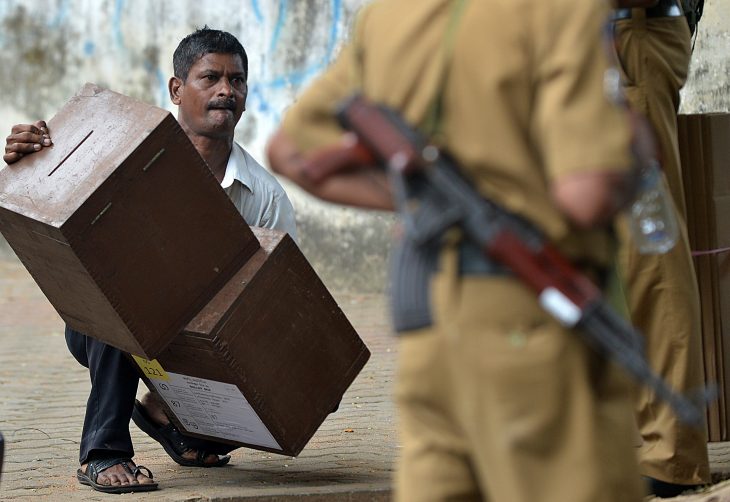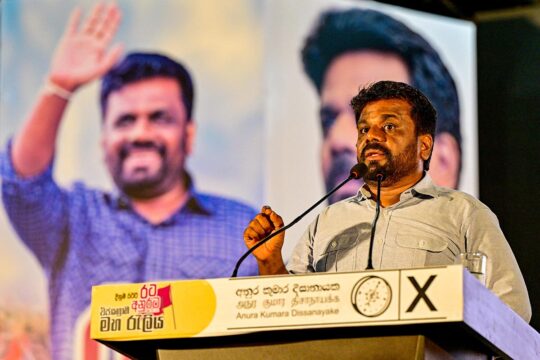Sri Lanka goes to the polls on Monday August 17 in parliamentary elections. According to a recent International Crisis Group Report, the outcome could be crucial for the fight against corruption and for reconciliation in a country still recovering from 25 years of violent conflict.
“Sri Lanka’s chance to finally start on the road to a sustainable resolution of the country’s decades-long ethnic strife, including a negotiated political settlement, depends on the outcome (of the elections),” says the ICG report.
Sri Lanka, a former British colony, is still scarred by 25 years of violence and conflict arising from tensions between the majority, mostly Buddhist Sinhalese and the minority, mostly Hindu Tamils in the northeast of the country.
The Sinhalese resented what they saw as British favouritism towards the Tamils. The growth of Sinhala nationalism after independence in 1948 stoked ethnic division, and civil war erupted in the 1980s as Tamils pressed for self-rule.
Sri Lanka's civil war ended in May 2009 when government forces seized the last Tamil-held land. Some 70,000 people were killed in the conflict, which also damaged the economy and harmed tourism in one of South Asia's potentially most prosperous countries. International concern was raised especially about the fate of civilians caught up in the conflict zone in the final stages of the war, the confinement of some 250,000 Tamil refugees to camps for months afterwards, and allegations that the government ordered the execution of captured or surrendering rebels.
A UN report published in 2011 said both sides in the conflict committed war crimes against civilians. The Sri Lankan government rejected this and other reports as biased.
A Rajapaksa comeback?
A key question is the amount of parliamentary support that voters will give to two major players: current President Maithripala Sirisena; and ex-president (2005-2015) Mahinda Rajapaksa, who was unexpectedly unseated by his former health minister Sirisena in January this year and is now trying to make a comeback as an MP, or even Prime Minister.
“With the UPFA (United People’s Freedom Alliance, seen as mainly pro-Rajapaksa) arguing the UNP (United National Party, seen as mainly pro-Sirisena) threatens national security and supports Tamil separatism, the election will test the strength of Rajapaksa’s brand of Sinhala nationalism, as well as the depth of public concern over corruption and abuses of power,” says the ICG report. “Even if he cannot become prime minister, Rajapaksa’s leadership of a large Sinhala nationalist bloc in parliament could make it harder for a UNP-led government to act as promised on reconciliation and accountability.”
Alleged war crimes
Under Rajapaksa, the Sri Lankan government resisted any idea of an international inquiry into alleged war crimes or international involvement in post-conflict justice and reconciliation. It argued that this was not necessary and would violate national sovereignty. Sirisena, although also Sinhalese, has taken a more conciliatory stance.
“The Sirisena-UNP government set a new, less Sinhala triumphalist tone on ethnic issues,” says the ICG report, “and took some steps for reconciliation: releasing a number of Tamil political prisoners and limited amounts of military-occupied land in Tamil areas, while reducing the presence, though not size, of the military and its involvement in governing the north and east. Despite growing frustration among many Tamils, larger moves have been put off until after elections, as has action on alleged war crimes by both the military and the defeated Tamil Tigers. The government promises a credible domestic inquiry that meets international standards, but doubts about its willingness and ability to tackle institutionalized impunity and prosecute war crimes are widespread and well founded. Successful prosecutions require significant legal and institutional reforms and management of resistance from military leaders and nationalist parties.”
It remains to be seen what the outcome of these elections will be. Meanwhile, the UN Office of the High Commissioner of Human Rights (OHCHR) is due to deliver its long-awaited war crimes report to the UN Human Rights Council (HRC) before it meets in September.
“At that session,” says ICG, “the newly-elected government should commit to the legal reforms needed to effectively prosecute serious human rights violations suffered by all ethnic communities, including war crimes; to pursue prosecutions with adequate witness protection and international involvement; and to consult widely with victims, survivors and community groups on its longer-term program of transitional justice, including a possible truth commission. To be effective, these processes will require consistent international scrutiny and participation, including OHCHR assistance to investigations and continued monitoring and reporting to the HRC. ”






